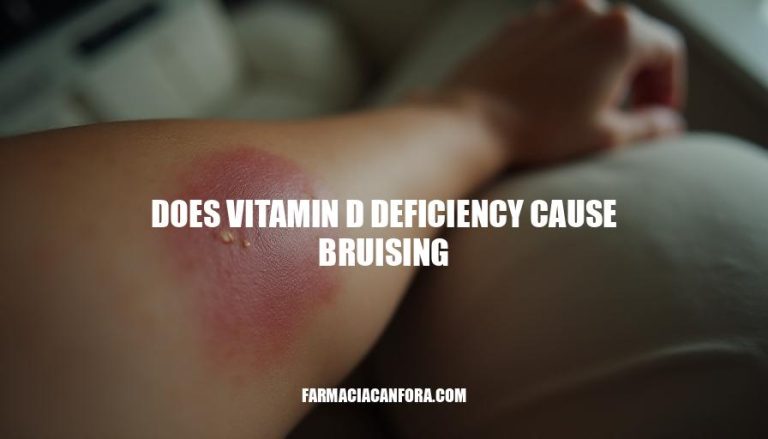


Vitamin D is a key player in keeping our bodies healthy. It helps with bone strength, immune function, and muscle power. We get it from sunlight, fatty fish, dairy products, and supplements.
Vitamin D also helps us absorb calcium, which keeps our bones strong.
Not having enough vitamin D can cause problems like weak bones, tired muscles, and a weakened immune system. In severe cases, it can lead to conditions like rickets in kids or osteomalacia in adults, where the bones become soft. Vitamin D deficiency has also been linked to infections, mood swings, and chronic diseases.
One thing that’s not as well-known is how vitamin D affects bruising.
Bruises happen when tiny blood vessels under our skin get damaged, causing blood to leak out and turn blue or purple. Nutritional deficiencies can make these blood vessels weak, making it harder for our bodies to heal from small injuries. The connection between vitamin D levels and bruising is worth looking into, especially since vitamin D affects how well our blood vessels work and how we recover from injuries.
Vitamin D deficiency has been linked to various health issues, including potential effects on tissue integrity and vascular health, which may contribute to easier bruising. Vitamin D plays a crucial role in calcium homeostasis and bone health, but its influence extends to other physiological processes, including the maintenance of vascular and connective tissue health.
Tissue Integrity: Vitamin D is essential for the regulation of collagen synthesis, a key structural protein in connective tissues. Collagen provides strength and elasticity to blood vessels and skin.
A deficiency in vitamin D can impair collagen production, leading to weakened blood vessel walls and skin tissues. This structural compromise increases the likelihood of blood vessels rupturing under minor trauma, resulting in bruising.
Vascular Health: Vitamin D has anti-inflammatory properties and helps regulate endothelial function, which is critical for vascular health. Endothelial cells line the interior surface of blood vessels and play a role in maintaining vascular tone and integrity.
A deficiency in vitamin D can lead to endothelial dysfunction, increasing the fragility of blood vessels and making them more susceptible to damage.
Scientific Findings: Studies have explored the relationship between vitamin D levels and bruising. For instance, research has shown that vitamin D deficiency is associated with increased vascular fragility and impaired wound healing. These findings suggest that insufficient vitamin D levels may compromise the body’s ability to repair and maintain vascular and connective tissues, thereby contributing to easier bruising.
Additional Factors: Vitamin D deficiency may also indirectly affect bruising by impairing calcium absorption.
Calcium is vital for blood clotting and vascular contraction. A deficiency in vitamin D can lead to hypocalcemia, which may further exacerbate vascular fragility and increase the risk of bruising.
These insights underscore the importance of maintaining adequate vitamin D levels for overall vascular and tissue health. Addressing vitamin D deficiency through dietary sources, supplementation, or safe sun exposure may help mitigate the risk of bruising and other related health issues.
Vitamin D plays a crucial role in maintaining vascular and tissue health, which can impact the likelihood of bruising.
Studies have shown that vitamin D deficiency is associated with increased vascular fragility and impaired wound healing.
Maintaining adequate vitamin D levels through dietary sources, supplementation, or safe sun exposure can help mitigate the risk of bruising and other related health issues.
It’s essential to address vitamin D deficiency to maintain overall vascular and tissue health. If you’re concerned about your vitamin D levels or experience frequent bruising, consult with a healthcare professional for further understanding and management.